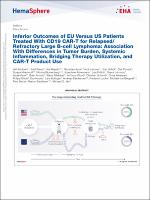| dc.contributor | Vall d'Hebron Barcelona Hospital Campus |
| dc.contributor.author | Perez, Ariel |
| dc.contributor.author | Jurinovic, Vindi |
| dc.contributor.author | Holtick, Udo |
| dc.contributor.author | Rejeski, Kai |
| dc.contributor.author | Bücklein, Veit |
| dc.contributor.author | IACOBONI, GLORIA |
| dc.date.accessioned | 2023-08-21T09:52:24Z |
| dc.date.available | 2023-08-21T09:52:24Z |
| dc.date.issued | 2023-07-11 |
| dc.identifier.citation | Bücklein V, Perez A, Rejeski K, Iacoboni G, Jurinovic V, Holtick U, et al. Inferior Outcomes of EU Versus US Patients Treated With CD19 CAR-T for Relapsed/Refractory Large B-cell Lymphoma: Association With Differences in Tumor Burden, Systemic Inflammation, Bridging Therapy Utilization, and CAR-T Product Use. HemaSphere. 2023 Jul 11;7(8):e907. |
| dc.identifier.issn | 2572-9241 |
| dc.identifier.uri | https://hdl.handle.net/11351/10105 |
| dc.description | Linfoma de células B; Carga tumoral; Inflamación sistémica |
| dc.language.iso | eng |
| dc.publisher | Wolters Kluwer Health |
| dc.relation.ispartofseries | HemaSphere;7(8) |
| dc.rights | Attribution-NonCommercial-NoDerivatives 4.0 International |
| dc.rights.uri | http://creativecommons.org/licenses/by-nc-nd/4.0/ |
| dc.source | Scientia |
| dc.subject | Cèl·lules B - Tumors - Immunoteràpia |
| dc.subject | Avaluació de resultats (Assistència sanitària) |
| dc.subject.mesh | Lymphoma, B-Cell |
| dc.subject.mesh | /therapy |
| dc.subject.mesh | Immunotherapy, Adoptive |
| dc.subject.mesh | Treatment Outcome |
| dc.title | Inferior Outcomes of EU Versus US Patients Treated With CD19 CAR-T for Relapsed/Refractory Large B-cell Lymphoma: Association With Differences in Tumor Burden, Systemic Inflammation, Bridging Therapy Utilization, and CAR-T Product Use |
| dc.type | info:eu-repo/semantics/article |
| dc.identifier.doi | 10.1097/HS9.0000000000000907 |
| dc.subject.decs | linfoma de células B |
| dc.subject.decs | /terapia |
| dc.subject.decs | inmunoterapia adoptiva |
| dc.subject.decs | resultado del tratamiento |
| dc.relation.publishversion | https://doi.org/10.1097/HS9.0000000000000907 |
| dc.type.version | info:eu-repo/semantics/publishedVersion |
| dc.audience | Professionals |
| dc.contributor.organismes | Institut Català de la Salut |
| dc.contributor.authoraffiliation | [Bücklein V] Department of Medicine III, University Hospital, LMU Munich, Germany. Laboratory for Translational Cancer Immunology, LMU Gene Center, Munich, Germany. [Perez A] Department of Blood and Marrow Transplant and Cellular Immunotherapy, Moffitt Cancer Center, Tampa, FL, USA. Blood and Marrow Transplant Program, Miami Cancer Institute, Miami, FL, USA. [Rejeski K] Department of Medicine III, University Hospital, LMU Munich, Germany. Laboratory for Translational Cancer Immunology, LMU Gene Center, Munich, Germany. German Cancer Consortium (DKTK) Munich Site, and German Cancer Research Center (DKFZ), Heidelberg, Germany. [Iacoboni G] Vall d’Hebron Institute of Oncology (VHIO), Barcelona, Spain. Servei d’Hematologia, Vall d’Hebron Hospital Universitari, Barcelona, Spain. Departament de Medicina, Universitat Autònoma de Barcelona, Bellaterra, Spain. [Jurinovic V] Institute for Medical Information Processing, Biometry, and Epidemiology, LMU Munich, Germany. [Holtick U] Department I of Internal Medicine, Medical Faculty and University Hospital, Cologne, University of Cologne, Germany |
| dc.identifier.pmid | 37449196 |
| dc.identifier.wos | 001029914500001 |
| dc.rights.accessrights | info:eu-repo/semantics/openAccess |

 Área privada
Área privada Contacto
Contacto








